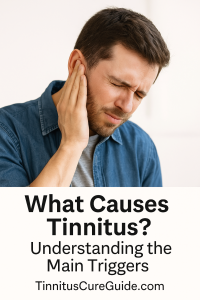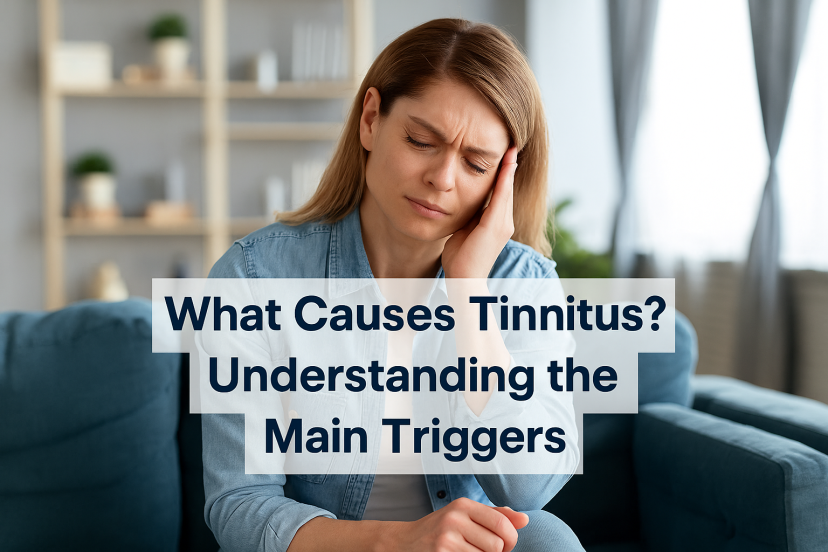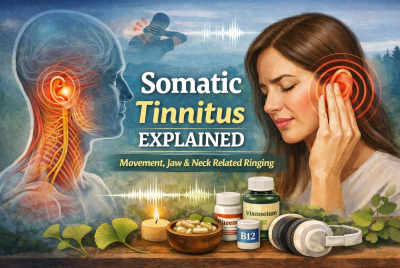What Causes Tinnitus? Understanding the Main Triggers
🔊 The Constant Ringing That Won’t Go Away
If you’ve ever noticed a persistent ringing, buzzing, or whooshing sound in your ears — especially when the world around you is quiet — you’re not alone. Millions of Americans experience tinnitus every year, and for many, it can affect sleep, focus, and peace of mind. But what causes tinnitus?
Whether it’s caused by loud concerts, certain medications, or even stress, tinnitus can feel mysterious and frustrating. The good news? Understanding what causes tinnitus is the first step toward relief.
This article explains the main physical and lifestyle triggers of tinnitus, how to identify them, and practical ways to manage or prevent flare-ups.
🧠 What Exactly Is Tinnitus?
Tinnitus isn’t a disease — it’s a symptom. It refers to the perception of sound when no external sound source exists.
Common tinnitus sounds include:
-
Ringing or buzzing in the ears
-
Hissing, humming, or clicking
-
Roaring or whooshing sensations
According to the American Tinnitus Association, around 25 million U.S. adults experience tinnitus each year, and about 5 million deal with it constantly.
🎧 The Main Physical Causes of Tinnitus
Let’s explore the leading medical and physiological reasons tinnitus can develop — many of which are treatable or manageable.
1. 🔊 Loud Noise Exposure (Noise-Induced Hearing Damage)
The most common cause of tinnitus in the U.S. is prolonged exposure to loud noise. Sounds above 85 decibels — like concerts, power tools, or earbuds at high volume — can damage tiny hair cells inside the cochlea (inner ear).
Once these delicate cells are damaged, they can’t regenerate, leading to both hearing loss and tinnitus.
Prevention Tips:
✅ Use noise-canceling headphones or earplugs at concerts.
✅ Follow the 60/60 rule — listen to music at no more than 60% volume for 60 minutes at a time.
✅ Limit exposure to loud household tools and engines.
2. 👂 Earwax Buildup or Blockage
When earwax (cerumen) builds up excessively, it can block the ear canal, causing pressure changes and irritation that trigger tinnitus.
What to Do:
-
Never insert cotton swabs deep into the ear canal.
-
Use warm water or ear drops to soften wax safely.
-
For severe blockages, see an ENT (ear, nose, and throat) specialist for professional cleaning.
3. 💊 Medications That May Cause Tinnitus (Ototoxic Drugs)
Certain medications can damage inner ear structures or alter auditory nerve signals. These are called ototoxic medications.
Common culprits include:
-
High doses of aspirin or NSAIDs (ibuprofen, naproxen)
-
Some antibiotics (e.g., gentamicin)
-
Loop diuretics (for high blood pressure)
-
Chemotherapy drugs (like cisplatin)
Tip: Never stop prescribed medications on your own — talk to your doctor if you suspect a link between your meds and tinnitus.
4. ❤️ Circulatory Problems and High Blood Pressure
Poor circulation and hypertension (high blood pressure) can increase pressure in the tiny blood vessels of the ear, causing pulsatile tinnitus — a rhythmic whooshing sound in sync with your heartbeat.
Prevention Tips:
-
Keep blood pressure in check through diet and exercise.
-
Eat heart-healthy foods like leafy greens, salmon, and berries.
-
Avoid smoking and excess caffeine, which can raise blood pressure.
5. 🧩 Ear Infections or Eustachian Tube Dysfunction
Inflammation or infection in the middle ear can affect fluid balance and pressure, leading to temporary tinnitus.
This is especially common during sinus infections or seasonal allergies.
Relief Options:
-
Warm compresses and hydration can ease discomfort.
-
Over-the-counter decongestants may help reduce pressure.
-
If symptoms persist, see an ENT for an ear exam.
6. 🦴 Age-Related Hearing Loss (Presbycusis)
As we age, our auditory nerve and hair cells naturally weaken. By age 65, 1 in 3 Americans has some degree of hearing loss — and tinnitus often accompanies it.
Support Strategies:
-
Consider hearing aids that include tinnitus masking features.
-
Get hearing tested every 1–2 years after age 50.
-
Stay socially and mentally active to keep auditory processing sharp.
🌿 Lifestyle & Environmental Triggers
Not all tinnitus originates from ear damage. Sometimes, daily habits and stress play a huge role.
7. 🧠 Stress and Anxiety
Stress doesn’t cause tinnitus directly, but it can make symptoms far worse. When you’re tense, your brain amplifies background noise — making ringing more noticeable.
Try:
-
Daily breathing or meditation (the Calm or Insight Timer app works well)
-
Gentle yoga or stretching
-
Listening to white noise or nature sounds before bed
8. ☕ Caffeine, Nicotine, and Alcohol
These stimulants can narrow blood vessels and increase nerve sensitivity, making tinnitus louder or more persistent.
Lifestyle Adjustments:
✅ Switch to decaf or herbal tea.
✅ Reduce alcohol and avoid smoking.
✅ Stay hydrated to maintain good ear circulation.
9. 🍔 Poor Diet and Nutrient Deficiencies
Deficiencies in magnesium, zinc, and vitamin B12 are linked to tinnitus and hearing issues. These nutrients support nerve health and circulation.
Helpful Supplements:
-
Magnesium: May reduce inner ear inflammation.
-
Vitamin B12: Supports auditory nerve repair.
-
Zinc: Protects against oxidative stress in ear tissues.
Always consult your healthcare provider before starting supplements.
10. 💤 Lack of Sleep or Fatigue
Tiredness can heighten tinnitus perception, making the ringing seem louder. Good sleep helps calm the auditory system and reduce anxiety.
Better Sleep Tips:
-
Keep a consistent bedtime.
-
Avoid screens 1 hour before bed (blue light suppresses melatonin).
-
Use a white noise machine or fan to mask ringing sounds.
🧘♀️ Natural Remedies and Management Techniques
While there’s no universal “cure” for tinnitus, many people find relief through holistic approaches that calm both the body and mind.
Popular Natural Relief Options:
🌿 Ginkgo biloba: May improve blood flow to the inner ear.
🧘♀️ Sound therapy: Use apps like ReSound Relief or Widex Zen for masking tones.
💆♂️ Massage therapy: Reduces muscle tension around the neck and jaw.
🎧 Tinnitus retraining therapy (TRT): Gradual desensitization using sound and counseling.
🏥 When to See a Doctor
You should consult an audiologist or ENT specialist if:
-
Tinnitus occurs suddenly or in one ear only.
-
You also experience dizziness, vertigo, or hearing loss.
-
The sound pulses with your heartbeat (pulsatile tinnitus).
-
You have ear pain, pressure, or discharge.
Prompt evaluation can help detect underlying causes like ear infections, TMJ, or hearing loss early.
❓ FAQs About Tinnitus Causes
1. Can earwax really cause tinnitus?
Yes — a wax blockage can press against the eardrum and cause ringing until it’s safely removed.
2. What’s the most common cause of tinnitus?
Prolonged loud noise exposure is the leading cause, especially in musicians and factory workers.
3. Does tinnitus mean I’m losing my hearing?
Not always, but many people with tinnitus have some degree of hearing loss. A hearing test can clarify this.
4. Can stress or anxiety make tinnitus worse?
Absolutely. Stress increases muscle tension and nerve sensitivity, which can intensify ringing.
5. Will tinnitus go away on its own?
For some, it fades after a few days or weeks — especially if it’s linked to noise exposure or an ear infection.
6. Are there any proven supplements for tinnitus?
Ginkgo biloba, magnesium, and vitamin B12 show some promise in studies, but results vary by individual.
7. Can tinnitus be prevented?
Yes — by protecting your ears, managing stress, and maintaining overall ear health through good diet and habits.
🌟 Conclusion: Finding Peace Amid the Noise
Tinnitus may not always disappear completely, but understanding what causes tinnitus — and addressing those triggers — can make a life-changing difference.
By protecting your ears from loud sounds, managing stress, and supporting your body with good nutrition and rest, you can significantly reduce the noise and reclaim your calm.
Consistency and patience are key — with the right lifestyle changes and professional guidance, you can live comfortably and confidently despite tinnitus.
⚠️ Disclaimer
This article is for informational purposes only and is not a substitute for medical advice. Always consult a qualified healthcare provider or audiologist for diagnosis and treatment of tinnitus or related conditions.

- Does Ginkgo Biloba Really Help With Tinnitus?
- Magnesium for Tinnitus
- Tinnitus After Ear Infection: What You Need to Know





